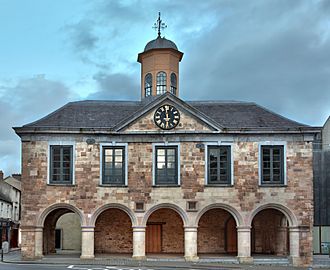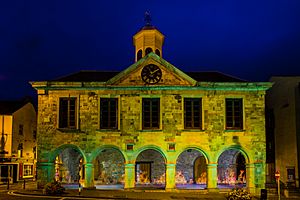Main Guard (Clonmel) facts for kids
Quick facts for kids The Main Guard |
|
|---|---|

Front façade
|
|
| General information | |
| Type | courthouse |
| Architectural style | Palladian |
| Address | 57 Gladstone Street |
| Town or city | Clonmel |
| Country | Ireland |
| Coordinates | 52°21′11″N 7°42′05″W / 52.353149°N 7.701415°W |
| Elevation | 24 m (79 ft) |
| Construction started | 1674 |
| Owner | Office of Public Works |
| Technical details | |
| Material | sandstone, limestone, steel, lead, timber, slate |
| Floor count | 2 |
| Designations | |
| Official name: Clonmel Mainguard Courthouse | |
| Reference #: | 667 |
The Main Guard is an old building in Clonmel, Ireland. It used to be a courthouse where important legal cases were heard. Today, it's a special protected building, known as a National Monument, which means it's very important to Ireland's history.
Contents
Where is The Main Guard?
The Main Guard is right in the middle of Clonmel town. It's located just north of the River Suir, which flows through the town.
A Look Back: The Main Guard's History
Early Days and Purpose
The Main Guard got its name because it was once the place where the main group of soldiers for Clonmel were stationed. In 1650, during a big fight called the Siege of Clonmel, the old court building was destroyed.
After this, a powerful leader named the 1st Duke of Ormonde got his special rights back in 1662. He ordered a brand new courthouse to be built. Some of the stones used to build it came from an old abbey called Inislounaght Abbey, which had closed down many years before in 1540.
The new building was finished in 1674. It served as the courthouse for the special area of County Tipperary known as a "Palatinate." This meant the Duke had special ruling powers there, almost like a small kingdom. The building also had fancy private rooms, a dining room, and a drawing room. These rooms were even used to host King James II when he visited Clonmel in 1689. The building was also used as a "tholsel," which was a place to collect tolls or fees. Some parts of its design were inspired by the famous architect Sir Christopher Wren.
Changes Over Time
In 1715, the special "Palatinate" ruling power in Tipperary ended. After that, the Clonmel Assizes (which were like big court sessions) were held in The Main Guard. A famous case happened there in 1766, involving Father Nicholas Sheehy. He was a person who spoke out against the Penal Laws, which were unfair rules against certain groups of people in Ireland. Father Sheehy was put on trial in the building and later faced a severe punishment.
Around 1810, the ground floor of The Main Guard, which had open arches, was changed into shops. A basement was dug out, and more floors were added inside.
Modern Restoration
In the 1990s, the Office of Public Works started a big project to bring The Main Guard back to its original look. Now, the beautiful open arches made of sandstone columns are once again a key part of the street in Clonmel.
The Building's Design
The Main Guard is a building that used to stand alone. It has five sections (called "bays") and two floors. It was designed as both a courthouse and a market house. The ground floor has an arcade of open arches.
The building uses classical design elements, like the triangular shape at the top called a pediment. A major project to restore the building started in 2004. This work was designed by Punch Consulting.
 | James Van Der Zee |
 | Alma Thomas |
 | Ellis Wilson |
 | Margaret Taylor-Burroughs |


